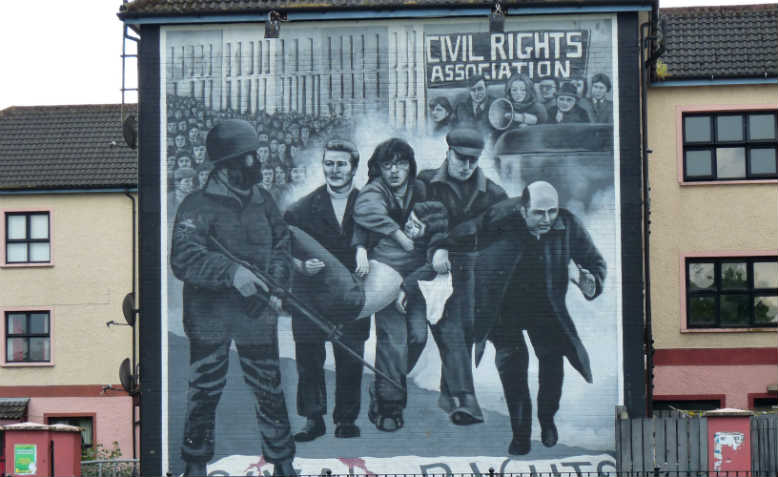 Bloody Sunday mural, Derry. Photo: Flickr/murielle29
Bloody Sunday mural, Derry. Photo: Flickr/murielle29
The British state would prefer we forget about the cold-blooded murder it sanctioned on Bloody Sunday, we can’t let them escape justice, argues Chris Bambery
The fact that one former British soldier has been charged on two counts of murder and four counts of attempted murder in relation to what occurred in Derry on Bloody Sunday in January 1972 is a remarkable achievement for the relatives of those killed that day.
Of course, it also falls far short of total justice in that only one soldier has been charged, and been granted anonymity.
What took place on Bloody Sunday was cold-blooded murder. Fourteen unarmed civil rights marchers were gunned down by members of the crack Paratroop Regiment specially deployed to Derry that day.
The Saville Inquiry set up by the Tony Blair government to investigate events that day acknowledged that, but also insisted that British soldiers were out of control.
That was not true. The Paratroop Regiment were sent to Derry in an operation sanctioned by the British government of Edward Heath and by the top military command, both in London and those in charge in Northern Ireland.
The problem with today’s announcement that one former soldier faces criminal charges is that it allows those pulling the strings off Scotch free.
To repeat a point I made in an earlier article, the British army does not let its troops escape control, atrocities like Bloody Sunday are sanctioned by their commanders.
In the case of Bloody Sunday, it was sanctioned in Downing Street too.
The idea was that by opening fire on civil rights marchers, protesting internment without trial, it would force the Provisional IRA into action that day and allow the Paratroopers to take them out in a gun battle.
The Provos did not respond and a cover up was ordered, which included an official inquiry.
Isn’t this ancient history, best forgotten? The reaction of Defence Secretary, Gavin Williamson, and other top Tories and members of the defence establishment suggests so. They were quick to attack the charging of the former soldier.
The main reason is that British imperialism may be much weaker than in the past but it hasn’t changed its spots – Afghanistan and Iraq demonstrated that.
But the Irish issue has come to the fore again with Theresa May’s deal with the Democratic Unionists whereby they provide the extra votes she needs to stay in Downing Street (I hesitate to say govern) and by Brexit and the issue of the Irish border. To my mind, partition inflicted on Ireland in 1921 is doomed. At this time the last thing the British state needs the spotlight turned on is its crimes in Ireland. Bloody Sunday was a crime but one chapter in a vey long and bloody history. Our rulers prefer that is forgotten. But to do so is to let them escape justice and do similar again.

